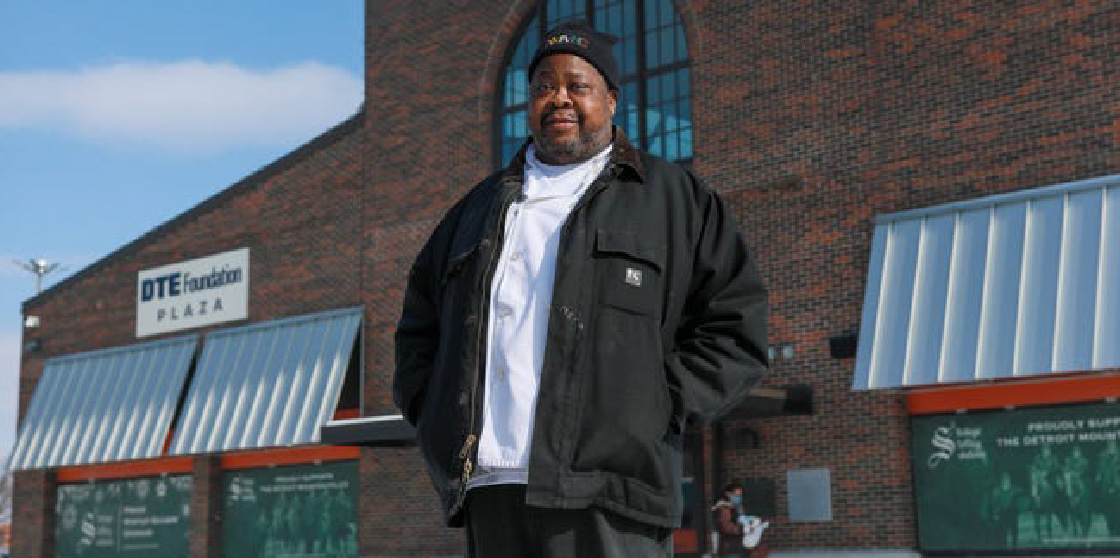

Photo Credit: Kimberly P. Mitchell, Detroit Free Press.
A meal shared is a story told. That’s the philosophy of the Detroit Free Press’ Chef of the Year, Phil Jones. You may recognize the name from some of the city’s most respected culinary destinations – Fishbones, Beverly Hills Grill, LOLA – but now, in the wake of global pandemic, the awarded chef transcends beyond the confines of a traditional restaurant space, and in doing so, offers a shift in perspective on the Service Industry, placing emphasis on the first word and demanding critique of what follows.
On June 1, Farmacy Food – Jones’ most recent endeavor – launched its online services, officially inviting Detroiters to partake in a radical re-examination of our present food system.
Farmacy Food will provide fresh, healthy, locally-sourced meals via delivery, pick-up and smart fridges – high-tech vending machines offering nutritious alternatives to the standard candy and snack selection. Each meal costs $6-$12, with 40% discounts offered to seniors, veterans, students, educators, low-income individuals and those without homes.
The organization was founded to address a reality in our community: Detroit’s health is suffering. While historically the burden has been placed upon the shoulders of our healthcare system, Jones believes the problem stems from an obvious source: the food we eat.
“We lack freshness, local procurement, thoughtfulness in preparation in terms of ingredients and health goals,” says Jones. “We don’t care about our food enough and we don’t care about the people eating it enough”
For many Detroiters, high quality, nutritious food is hard to find. But all too often, this scarcity is attributed to the notion that healthy food is inherently expensive. And then there’s the argument of accessibility. How can anyone maintain a healthy diet without access to fresh produce?
According to Jones, the two go hand-in-hand. “Accessibility means affordability. Healthy food should be affordable. And it can be,” Jones explains. “It is a fallacy that healthy food has to be expensive.”
There are ways of feeding people that aren’t expensive. Good, nutritional, wholesome food. We’re viewing capitalism in a totally different way. We’re looking at it as something that can benefit people as opposed to just taking advantage of communities.”
So how is this possible? How can a grassroots business like Farmacy Food provide a legitimate solution to problems so deeply ingrained in society? According to Jones, the answer lies in fresh, locally-sourced ingredients. In partnering with local farms and vendors, he intends to cut out the middle-man and the processing that food experiences on its journey to our plate.
“You can’t tell me that a food product that you don’t add anything to should be more expensive than products you do add stuff to,” he laughed.
Seems simple enough. But when you’re going up against an entire, globalized food system, there’s sure to be challenges. Jones is prepared to take them in stride.
“We’re not a business first, we are a service first,” he explained. “While profits are important, people are more important. Our initial reason for being is to help people move from a place of bad health to a place of good health. There is no dollar amount that’s more important than that.”
That’s not to say dollars aren’t on Jones’ mind. He’s just looking down the road.
“The long-term cost in health is much more than the cost of the food,” Jones said. “We want people to focus on the good food and ultimately, they’ll wind up with the good health. There you’ll see the savings. There you’ll see the money coming back. All of the things that bad food takes away from us at the end of our days, we’re trying to restore on the front end.”
Of course, Jones recognizes that the proof will lie in the (fresh, locally-sourced) pudding.
To this end, Farmacy Food is working to provide its customers with low-cost biometric testing, allowing individuals to monitor tangible improvements to their health. Jones hopes that in providing concrete documentation of positive results, the community will come to accept the role nutrition plays in our quality of life.
Every Dish Tells A Story
So, Phil Jones is a big ideas kind of guy. But he’s also a chef. And along with an overarching goal of improving his city’s health one meal at a time, he intends to convey stories that speak to his community.
“Our forefathers ate the food they ate for a reason,” he explained. “And a lot of those health benefits have been lost. It’s the story of the food, a story of inspiration, a story of what these ingredients can do for you. My personal recipes are based on people and places.”
Take his salmon Veracruz, for example – a dish inspired by the slave revolt resulting in an African community along Mexico’s Atlantic coast. Or his famous sweet potato pirogues with harvest greens, an homage to distinct Detroit communities — Black Bottom, Paradise Valley and Pole Town — that have suffered at the hands of Detroit’s urbanization and industrialization.
This dish speaks to the hope for Detroit. People reclaiming their space in the community. Reclaiming their culture. It talks about loss and looks forward to a hopeful future where we can grow together.
Growing Together
Chef Phil Jones humbly accepts the award of Chef of the Year, but he does not celebrate. For many, the tremendous honor would invite pause. A moment to bask in the acceptance of the surrounding community. But when Jones takes a look around, he sees a community in need – one he feels more suited than ever to serve.
With the introduction of Farmacy Food, our city gains not only a delicious, health-conscious deviation from the status quo but a vehicle for positive change and advocate for a stronger, healthier Detroit.

